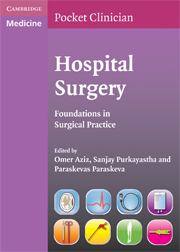Book contents
- Frontmatter
- Contents
- List of contributors
- Foreword by Professor Lord Ara Darzi KBE
- Preface
- Section 1 Perioperative care
- Consent and medico-legal considerations
- Elective surgery
- Special situations in surgery: the diabetic patient
- Special situations in surgery: the jaundiced patient
- Special situations in surgery: patients with thyroid disease
- Special situations in surgery: steroids and surgery
- Special situations in surgery: surgical considerations in the pregnant woman
- Haematological considerations: thrombosis in surgery
- Haematological considerations: bleeding
- Haematological considerations: haemorrhage (massive-bleeding protocol)
- Haematological considerations: blood products and transfusion
- Shock
- Fluid management
- Electrolyte management
- Pain control
- Nutrition
- Antibiotic prescribing in surgery
- Critical care: the critically-ill patient, decision making and judgement
- Critical care: cardiovascular physiology and support
- Critical care: respiratory pathophysiology and support
- Critical care: renal support
- Critical care: other considerations
- Postoperative complications
- Surgical drains
- Abdominal stoma care
- Section 2 Surgical emergencies
- Section 3 Surgical disease
- Section 4 Surgical oncology
- Section 5 Practical procedures, investigations and operations
- Section 6 Radiology
- Section 7 Clinical examination
- Appendices
- Index
Elective surgery
Published online by Cambridge University Press: 06 July 2010
- Frontmatter
- Contents
- List of contributors
- Foreword by Professor Lord Ara Darzi KBE
- Preface
- Section 1 Perioperative care
- Consent and medico-legal considerations
- Elective surgery
- Special situations in surgery: the diabetic patient
- Special situations in surgery: the jaundiced patient
- Special situations in surgery: patients with thyroid disease
- Special situations in surgery: steroids and surgery
- Special situations in surgery: surgical considerations in the pregnant woman
- Haematological considerations: thrombosis in surgery
- Haematological considerations: bleeding
- Haematological considerations: haemorrhage (massive-bleeding protocol)
- Haematological considerations: blood products and transfusion
- Shock
- Fluid management
- Electrolyte management
- Pain control
- Nutrition
- Antibiotic prescribing in surgery
- Critical care: the critically-ill patient, decision making and judgement
- Critical care: cardiovascular physiology and support
- Critical care: respiratory pathophysiology and support
- Critical care: renal support
- Critical care: other considerations
- Postoperative complications
- Surgical drains
- Abdominal stoma care
- Section 2 Surgical emergencies
- Section 3 Surgical disease
- Section 4 Surgical oncology
- Section 5 Practical procedures, investigations and operations
- Section 6 Radiology
- Section 7 Clinical examination
- Appendices
- Index
Summary
Aims
To assess and optimize co-existing medical conditions prior to surgery
To anticipate potential problems, inform the relevant people, and address these prior to admission, e.g. requires ICU (Intensive Care Unit) bed.
History
CARDIOVASCULAR (CVS)
History of hypertension? On antihypertensive medications?
MI: when? What treatment? Cardiology follow-up? If less than six months ago postpone elective surgery
Angina: stable/unstable? How frequently requires GTN spray? Exercise tolerance
Any symptoms of PND (paroxysmal noctural dyspnoea) or orthopnoea? How many pillows does patient sleep on at night?
Past history of rheumatic fever: has patient ever been diagnosed with ‘leaky valve’?
Any symptoms of palpitations, syncope, dizziness, blackouts, unexplained falls?
RESPIRATORY
History of asthma or COPD?
Episodes of bronchitis? If so, how frequently? Sputum production and colour of sputum
Inhalers? Home nebulisers? Home oxygen therapy?
Any hospital admissions with respiratory problems? If so, any ICU admissions?
Severity of dyspnoea, exercise tolerance
Current or past history of smoking? How many per day for how many years?
ABDOMINAL
History of indigestion or reflux?
Any past episodes of jaundice? Does patient have a diagnosis of chronic hepatitis?
Is there a history of renal disease? What is the cause?
Does patient require dialysis? If so, liaise with renal team prior to setting date for surgery
Does patient have a fluid restriction regime?
NEUROLOGICAL
History of CVA?
Epilepsy: how well controlled? When was last seizure?
If frequent seizures, refer to neurology team for optimization preoperatively
Rare conditions, e.g. myasthenia gravis, Duchenne's muscular dystrophy, myotonic dystrophy, multiple sclerosis – take full history of progression of disease.
- Type
- Chapter
- Information
- Hospital SurgeryFoundations in Surgical Practice, pp. 9 - 17Publisher: Cambridge University PressPrint publication year: 2009

